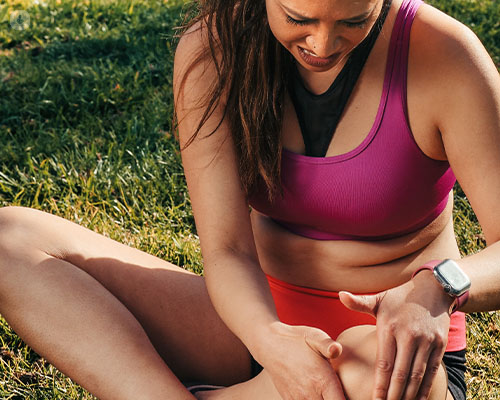Runner's knee: can I make a comeback?
Written by:For both avid and professional runners, it can be emotionally difficult to have to stop running after a knee injury. But without the appropriate rest and treatment, your comeback might take much longer than you had hoped - and even lead to further complications if you don't take the injury seriously!
Mr Gordon Shepard, a leading consultant orthopaedic surgeon, explains what type of knee injuries runners experience and when it's the best time to get knee pain looked at by a specialist.

Why is it important to get knee pain looked at in the earliest stages?
Knee pain is a sign of pathology, meaning that something is not right and it needs to be looked at. It may not even be a problem within the knee at all! Sometimes, knee pain is due to abnormal gait (a walking abnormality), hip problems, flat feet and a myriad of other issues. But most of the time, its due to an issue in or around the knee.
An expert opinion from a skilled practitioner, such as a physiotherapist or orthopaedic surgeon, before the pain becomes severe can pick up the diagnosis while it may be relatively straightforward to reverse with simple interventions. Untreated knee pain can lead to abnormal gait which can then lead to further issues and make treatment more complex.
What should you do if you notice knee pain from running?
Don’t ignore it! If the pain has been caused by a specific known injury whilst running then treatment should be sought from a physiotherapist or surgeon.
Pain that gradually comes on spontaneously may be initially treated by yourself by following the RICE procedure - Rest, Ice, Compression and Elevation. If after this it doesn’t resolve within a few days, or it does but then recurs, an opinion should be sought from a physiotherapist or an orthopaedic knee surgeon.
Can it completely go away by itself after resting the knee?
If the pain is treated rapidly - rather than ignoring it - then simple treatment and rest can completely resolve issues. However, most knee pain problems are caused by an underlying problem that may require treatment.
What are the different types of runner's knee?
Classically, runner’s or jogger’s knee refers to iliotibial band friction syndrome (ITBFS). This is caused by the tight band down the side of the thigh rubbing on the epicondyle (the bump of bone on the outer side of the knee.) As the irritation gets worse, the lining of the joint in the area becomes inflamed and swollen and so irritation is more likely. A classic vicious circle is set up. This is why rest can be effective if treated early.
Other forms of knee pain experienced in runners may be caused by:
- Patellar tendinitis
- Ligament strains
- Malalignment of the kneecap joint
- Arthritis
- Poor running technique
- Plica syndromes
- Many other causes
An assessment by a skilled practitioner is essential if the pain doesn’t settle quickly.

If conservative treatment fails, what happens next with surgery?
This is totally dependent on the cause. Thankfully for most patients, surgery is not required but can include:
- Keyhole (arthroscopic) surgery
- Stripping of tendons
- Ligament reconstructions
- Excision of bony spurs
Can I return to running after knee surgery?
The whole point of surgery is to return you to normal function. So, appropriate surgery followed by the right rehabilitation should allow you to return to running!
To make an appointment with Mr Gordon Shepard, visit his Top Doctors profile and book online.


